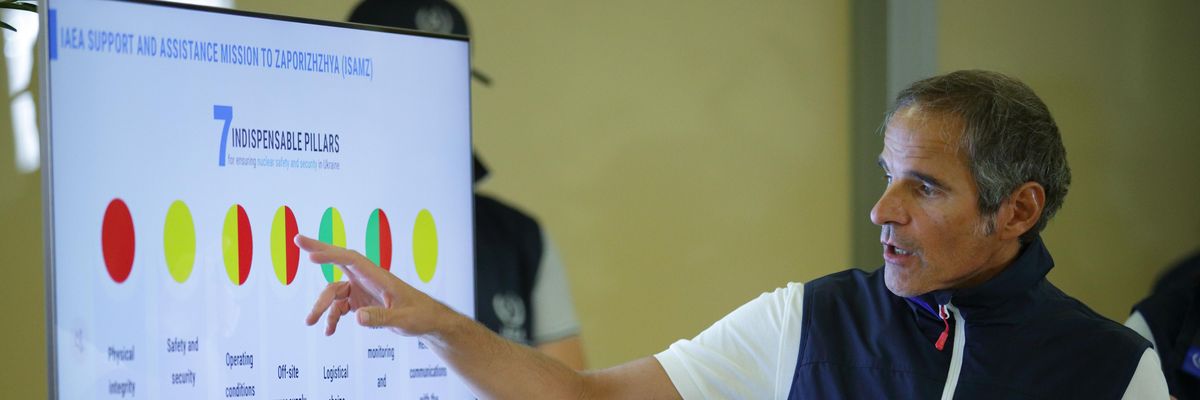The head of the International Atomic Energy Agency warned Tuesday that "something very, very catastrophic could take place" if shelling persists at Ukraine's Zaporizhzhia nuclear power plant, the subject of a new report issued by United Nations inspectors who visited the facility last week.
"The hits that this facility has received and that I could personally see and assess together with my experts is simply unacceptable," said IAEA Director-General Rafael Mariano Grossi. "We are playing with fire."
The IAEA report published on Tuesday lays out specific recommendations to address what Grossi, who led a 14-member team from the Vienna-based nuclear watchdog to Zaporizhzhia last week, has called the "seven indispensable pillars for ensuring nuclear safety and security in Ukraine."
Although the first pillar calls for not violating the physical integrity of nuclear facilities, "this happened, and continues to happen," Grossi told the U.N. Security Council, of which Russia is one of five permanent members with veto power, on Tuesday.
As the U.N. summarized:
The report proposes setting up a nuclear safety and security protection zone that would be limited to the perimeter and the plant itself.
Other recommendations call for removing all military vehicles and equipment from nuclear buildings at the site and ensuring the return to clear and routine responsibilities for staff, in addition to re-establishing an "appropriate" work environment.
U.N. Secretary-General Antonio Guterres on Tuesday endorsed the recommendations outlined in the IAEA report, reiterating his call for Russian and Ukrainian forces to cease fighting near Zaporizhzhia--where repeated shelling in recent weeks has sparked fears of a far-reaching disaster--and for the creation of a demilitarized perimeter around the facility.
"Any damage, whether intentional or not, to Europe's largest nuclear power plant in Zaporizhzhia--or to any other nuclear facility in Ukraine--could spell catastrophe, not only for the immediate vicinity, but for the region and beyond," said Guterres. "All steps must be taken to avoid such a scenario."
"Common sense and cooperation must guide the way forward," Guterres continued. "Any action that might endanger the physical integrity, safety, or security of the nuclear plant is unacceptable."
"As a first step, Russian and Ukrainian forces must commit not to engage in any military activity towards the plant site or from the plant site," said the U.N. chief. "The Zaporizhzhia facility and its surroundings must not be a target or a platform for military operations."
"As a second step, an agreement on a demilitarized perimeter should be secured," he added. "Specifically, that would include a commitment by Russian forces to withdraw all military personnel and equipment from that perimeter and a commitment by Ukrainian forces not to move into it."
In addition, "operators at the plant must be able to carry out their responsibilities, and communications must be maintained," said Guterres. "Now is the time to urgently agree on concrete measures to ensure the safety of the area."
A pair of IAEA inspectors will remain stationed indefinitely at Zaporizhzhia, where Ukrainian technicians have been working under the control of Russian soldiers since March.
"I trust that the IAEA experts now deployed to Zaporizhzhia will be able to carry out their work without hindrance and contribute to ensuring lasting nuclear safety and security in the plan," said Guterres. "All of us have a stake in the success of their critical mission."



